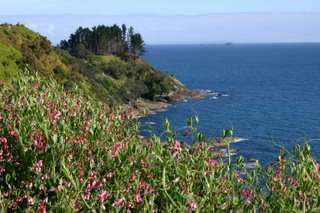
"If you would be a real seeker after truth,
it is necessary that at least once in your life
you doubt as far as possible, all things"
-Rene Descartes
After reading of the E.Coli breakout in the U.S. recently both here in the LA Times, and here in NPR , I was immediately taken back a few years to when I was managing multiple farm sites in New Zealand and Australia growing baby spinach and salad greens. Our main objective was of course, to deliver fresh, wholesome produce to our customers as quickly as possible. In Melbourne, we delivered the same day it was harvested, and it was in restaurants that night or the next day. In New Zealand, the same thing. Only when we started sending it to Tokyo and beyond, did we start to experience problems with shelf life and higher bacteria levels. Nowhere in the reports to date, have I found anyone talking about the transport problems and cool-chain that must be strictly followed as a source of the problem.
Fresh produce is supposed to be just that. Fresh. But because we don't grow and eat our food locally anymore, we tend to eat vegetables and fruit that have travelled long distances and spent many days before reaching our mouths. There are many reasons why this has happened, and the strain of E.Coli bacteria that is making people sick in the U.S. right now is just another symptom of an industrialised food system that is not working. For every hour spinach (and many leafy greens for that matter) is above optimum storage temp (4 -7 deg C) it loses a day in shelf life. So the more it travels, not only does the cost go up, the quality goes down, the risk of hitting a "break in the cool chain" increases, and the bacteria sets in. Eat local if you can. The finger pointing at organic produce and use of manures etc is well, just that. Bullshit.
Catherine Austin Fitts of Solari came and spoke on the island recently, and her background of high level finance and investment banking as well as government work with the first Bush administration got her into some hot water a few years ago, and her story is compelling. Apparently if something can save money for the taxpayer, it doesn't necesarily mean it will get a look in, as far as government is concerned. Fees for Friends is what counts. Try to stop that and red flags come up everywhere. Uh hello?
What she and her new company seek to do now is inform those who care, about investment models that are local, sustainable and most importantly, have integrity. Our little (or bigger as the case may be) savings, investments, pensions, etc are eagerly funding companies that may or may not be supporting the kind of world we want for ourselves and our children. Best to know where it is, because if we are not part of the solution, we very well could be part of the problem.
Her well written review of Al Gore's doco, An Inconvenient Truth brings up some interesting points that he clearly omits in the film. Like who caused this all to happen, and why?
But in India, the discovery of a new bird species is great news. The ongoing high suicide rate by small farmers who are crushed by debt pushed onto them by mutinational GE seed companies, is not. As this NYTimes article points out, they are led to believe their only salvation is (expensive) GE cotton, which will give them extra yields of disease free crops. Yeah right.
If you regularly share a bed with someone, then there is an excellent study recently completed by Dr. Paul Rosenblatt of the University of Minnesota that may be of interest to you as this NYT article points out:
Fresh produce is supposed to be just that. Fresh. But because we don't grow and eat our food locally anymore, we tend to eat vegetables and fruit that have travelled long distances and spent many days before reaching our mouths. There are many reasons why this has happened, and the strain of E.Coli bacteria that is making people sick in the U.S. right now is just another symptom of an industrialised food system that is not working. For every hour spinach (and many leafy greens for that matter) is above optimum storage temp (4 -7 deg C) it loses a day in shelf life. So the more it travels, not only does the cost go up, the quality goes down, the risk of hitting a "break in the cool chain" increases, and the bacteria sets in. Eat local if you can. The finger pointing at organic produce and use of manures etc is well, just that. Bullshit.
Catherine Austin Fitts of Solari came and spoke on the island recently, and her background of high level finance and investment banking as well as government work with the first Bush administration got her into some hot water a few years ago, and her story is compelling. Apparently if something can save money for the taxpayer, it doesn't necesarily mean it will get a look in, as far as government is concerned. Fees for Friends is what counts. Try to stop that and red flags come up everywhere. Uh hello?
What she and her new company seek to do now is inform those who care, about investment models that are local, sustainable and most importantly, have integrity. Our little (or bigger as the case may be) savings, investments, pensions, etc are eagerly funding companies that may or may not be supporting the kind of world we want for ourselves and our children. Best to know where it is, because if we are not part of the solution, we very well could be part of the problem.
Her well written review of Al Gore's doco, An Inconvenient Truth brings up some interesting points that he clearly omits in the film. Like who caused this all to happen, and why?
But in India, the discovery of a new bird species is great news. The ongoing high suicide rate by small farmers who are crushed by debt pushed onto them by mutinational GE seed companies, is not. As this NYTimes article points out, they are led to believe their only salvation is (expensive) GE cotton, which will give them extra yields of disease free crops. Yeah right.
If you regularly share a bed with someone, then there is an excellent study recently completed by Dr. Paul Rosenblatt of the University of Minnesota that may be of interest to you as this NYT article points out:
"In researching his book, Dr. Rosenblatt said even though many couples said they slept better alone, they still shared a bed. 'When I asked why, they looked at me as if I’d asked them why they keep breathing,' he said."
The days are getting longer as Spring slowly makes its way down here to us in the Southern Hemisphere. The first shoots from the grape buds are just emerging, the tuis and kererus are busy feeding off the many flowering trees, and the rays of the sun's warmth are oh, so welcome. The seasonal westerly winds that crash the waves up on the slippery rocks below my house create a symphonic healing balm for my soul on nights that are still a bit chilly, but hold promise for the playful summer ahead.
The days are getting longer as Spring slowly makes its way down here to us in the Southern Hemisphere. The first shoots from the grape buds are just emerging, the tuis and kererus are busy feeding off the many flowering trees, and the rays of the sun's warmth are oh, so welcome. The seasonal westerly winds that crash the waves up on the slippery rocks below my house create a symphonic healing balm for my soul on nights that are still a bit chilly, but hold promise for the playful summer ahead.




2 comments:
You make some great points about eating locally, and how vulnerable fresh foods are as they travel to various markets. But here in the midwestern U.S., those Chilean fruits are so tempting during the winter time. I wash and rinse them several times and have not had any problems, so far.
Hi, Michael. Thanks for visiting and leaving a comment over on Garden Rant. I'll check back here coz you're thinking and writing about a lot of the same shit I am.
But no fair having NZ to photograph - gorgeous! Susan
Post a Comment